FIND US: Namugongo
P.O.Box 2055 Kampala, Uganda
OPEN TIME: 08:30 - 17:00
Saturday and Sunday - Closed
P.O.Box 2055 Kampala, Uganda
Saturday and Sunday - Closed
 St Teresa Of Calcutta/ Mother Teresa
St Teresa Of Calcutta/ Mother Teresa
St. Teresa of Calcutta, who is more popular as Mother Teresa made a Holy pilgrimage to the shrine of the Holy Uganda Martyrs in 1988.
While in Uganda, she was hosted by the then Archbishop of Kampala His Eminence Emmanuel Cardinal Wamala, and she stayed with Sister of Immaculate Heart of Mary Reparatrix, Gogonya, also more popular as they Gogonya Sisters.
Daily Novena Prayer to St. Teresa of Calcutta, Mother Teresa.
St. Teresa of Calcutta, you allowed the thirsting love of Jesus on the Cross to become a living flame within you, and so became the light of His love to all. Obtain from the Heart of Jesus (here make your request).
Teach me to allow Jesus to penetrate and possess my whole being so completely that my life, too, may radiate His light and love to others. Amen. Immaculate Heart of Mary, Cause of Our Joy, pray for me. St. Teresa of Calcutta, pray for me!
Amen.
On his visit to Africa, Pope Francis visited Kenya, Uganda and the Central African Republic. He was in Uganda from the 27th to 29th of November 2015.
INVITATON
In December 2014, His Excellency Yoweri Kaguta Museveni, the president of Uganda, wrote to the Vatican state officially inviting the Holy Father to Uganda.
The Holy See on 10th September 2015 officially communicated the acceptance of Pope Francis.
POPE FRANCIS ARRIVES
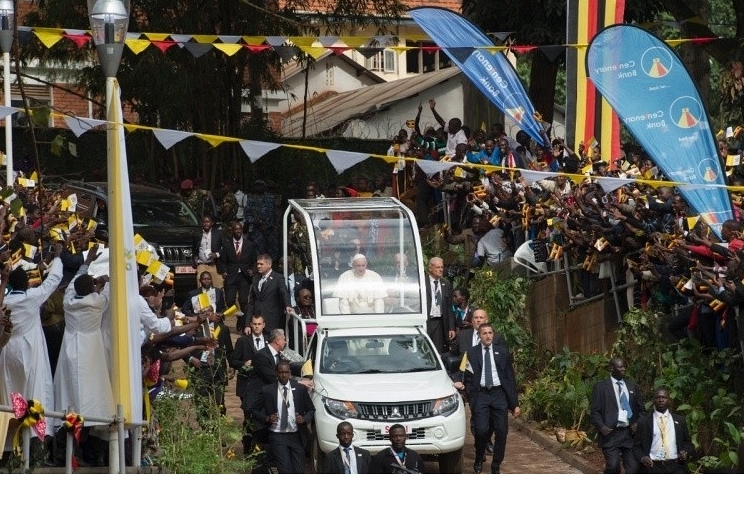 Pope Francis landed at Entebbe on 27th November at 05:05 PM aboard the Alitalia plane to a small crowd of the accredited persons.
Pope Francis landed at Entebbe on 27th November at 05:05 PM aboard the Alitalia plane to a small crowd of the accredited persons.
The Pope was welcomed by the Papal Nuncio Michael Blume, the President of the republic of Uganda, His Excellency Yoweri Kaguta Museveni and First Lady Janet Museveni.
The Pope was hosted at the state house, and then he visited Munyonyo Shrine, where he met catechists and teachers from across the country.
Among other places, the pope visited Uganda Martyrs Shrine Namugongo, Kololo, where he met the youth, Rubaga Cathedral and Mapeera Bakateyamba’s Home at Nalukolongo where he interacted with people with disabilities.
‘’I think of Saints Joseph Mukasa, Charles Lwanga, who after being evangelized by others, wanted to pass on the gift they received.’’
‘’You shall receive power when the Holy Spirit has come upon you’. And you shall be my witnesses in Jerusalem and in all Judea and Samaria to the end of the end of the earth. [Acts 1: 8].
From the age of the Apostles to our own day, great cloud of witnesses own day has been raised up to proclaim Jesus and show forth the power of the Holy Spirit. Today, we recall with gratitude the sacrifice of the Uganda martyrs, whose witness of love for Christ and his church as truly gone “to the end of the earth.”
We remember also the Anglican martyrs whose deaths for Christ’s testify to ecumenism of blood. All these witnesses nurtured the gift of the Holy Spirit in their lives and freely gave testimony of their faith in Jesus Christ, even at the cost of their lives, many at such a young age.
We two have received the gift of the spirit, to make us sons and daughters of god, but also so that we may bear witness to Jesus and make him every known and loved.
We receive the spirit when we were reborn in baptism and we were strengthened by his gifts at our confirmation.
Every day we are called to deepen the Holy Spirit presence in our life, to “fan into flame” the gift of his divine love so that so that we may be a source of wisdom and strength to others.
The gift of the Holy Spirit is a gift which is meant to be shared. It unites us to one another as believers and living members of Christ’s mystical body. We do not receive the gift of Holy Spirit for us alone but to build up one another in faith hope and love.
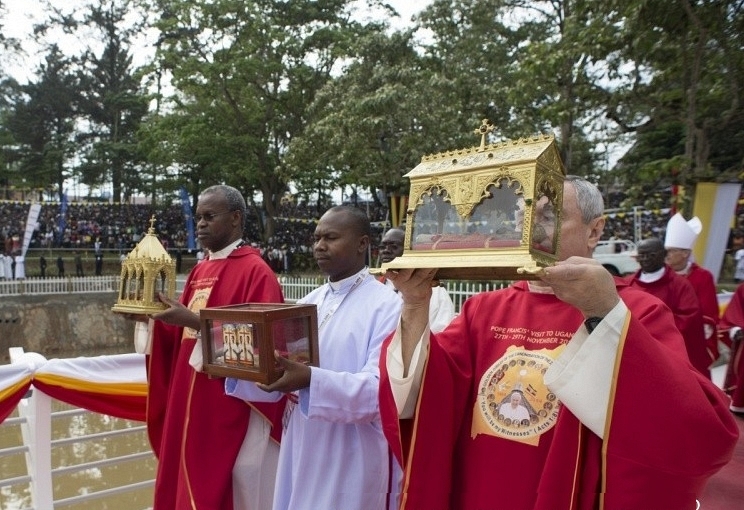 I think of saints’ joseph Mukasa and Charles Lwanga, who after being catechized by others, wanted to pass on the gift they had received. They did this in dangerous times. Not only were their lives threatened but so to were the lives of the lives of the young boy under care.
I think of saints’ joseph Mukasa and Charles Lwanga, who after being catechized by others, wanted to pass on the gift they had received. They did this in dangerous times. Not only were their lives threatened but so to were the lives of the lives of the young boy under care.
Because they attended to their faith and deepened their love of God, there were fearless in bringing Christ to others, even at the cost of their lives.
Their faith became witness, today venerated as martyrs, there example continues to inspire people thought the world. They continue to proclaim Jesus Christ and the power of his cross.
If like the martyrs, we daily fan into flame the gift of the spirit who dwells in our hearts, then we will surely became the missionary disciples which Christ calls us to be. To our families and friends certainly, but also those whom we do not know especially those who might be unfriendly, and even hostile to us.
This openness to others begins first in the family, in our homes were charity and forgiveness are learned, and the mercy and the love of God made known in our parents love. It finds expression too in our care for the elderly and the poor, the widowed, and the orphaned.
Just as the mother and the seven sons for the second book of Maccabees encouraged one another in their moment of great trial (7:1-2, 9-14), so to, as member of Gods family, we are to assist one another, to protect one another, and to lead one another to their fullness of life.
Here, I think with gratitude off all those bishops, priests, consecrated men and women, and the catechists who in many ways help to support Christian families may the church in this country continue especially thru through its communities, to assist young couples to prepare tor marriage, to encourage couples to live the marital bond in love and fidelity, and to assist parents in their duty as the first teachers of the faith for their children.
Like the apostles and the Uganda martyrs before us we have received the gift of the Holy Spirit to become missionary disciples called to go forth and bring the Gospel to all. At times this may take us to the end of the earth, as missionaries to faraway lands.
This is essential to the spread of Gods kingdom, and ask always for your generous response to this need. But we do not need to travel to be missionary disciples. In fact we need only to open our eyes and see the needs in our homes and local communities to realize how many opportunities awaits us.
Here too the Uganda martyrs show us the way. Their faith sought the good of all people, including the vey king who condemned them for their Christian beliefs.
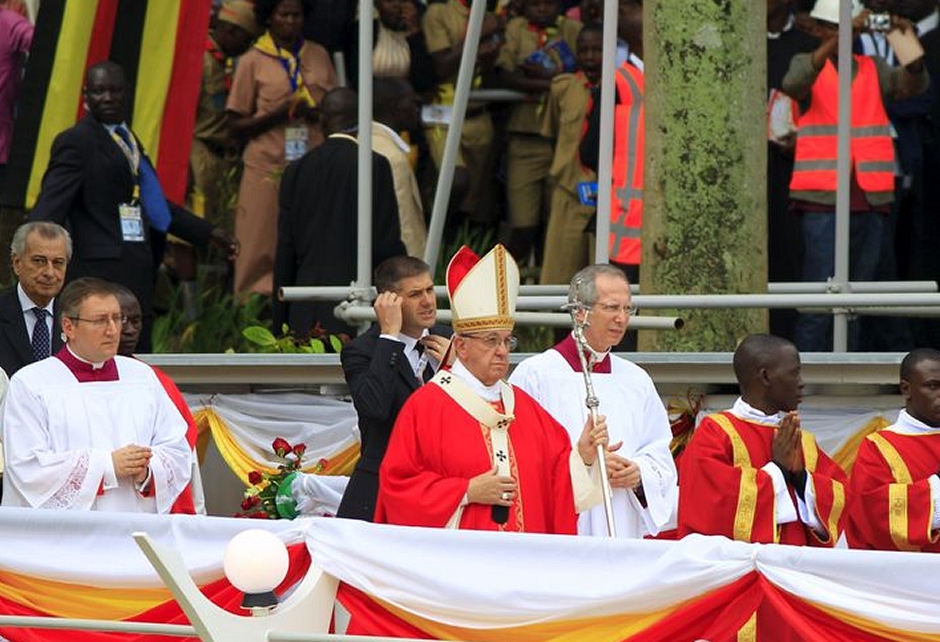 Their response was to meet hatred with love, and thus to radiate the splendor of the Gospel. They did not simply tell the king what the Gospel does not allow, but showed through their lives what saying “yes” to Jesus really means. It means mercy and purity of heart, being meek and poor in spirit, and thirsting for righteousness in the hope of an eternal reward.
Their response was to meet hatred with love, and thus to radiate the splendor of the Gospel. They did not simply tell the king what the Gospel does not allow, but showed through their lives what saying “yes” to Jesus really means. It means mercy and purity of heart, being meek and poor in spirit, and thirsting for righteousness in the hope of an eternal reward.
The witness of the martyrs shows to all who have heard their story, then and now, that the worldly pleasures and earthly power do not bring lasting joy or peace.
Rather, fidelity to God, honesty and integrity of life and genuine concern for the good of others bring us that peace which the world cannot give. This does not diminish our concern for this world, as if we only look to the life to come.
Instead, it gives purpose to our lives in this world, and helps us to reach out to those in need, to cooperate with others for common good, and to build a more just society which promotes human dignity, defends God’s gift of life and protects the wonders of nature, his creation and our common home.
Dear brothers and sisters, this is the legacy which you have received from the Uganda martyrs- lives marked by the power of the Holy Spirit, lives which witness even now to the transforming power of the Gospel of Jesus Christ. This legacy is not served by an occasional remembrance, or by being enshrined in a museum as a precious jewel.
Rather, we honour them, and all the saints, when we carry on their witness to Christ, in our homes and neighborhoods, in our workplaces and civil society, whether we never leave our homes or we go to the farthest Conner of the world.
May the Uganda martyrs, together with Mary, mother of the church intercede for us and may the Holy Spirit kindle within us the fire of this divine love!
Omukama Abawe Omukisa! (God bless you!)”
POPE JOHN PAUL II'S PASTROAL VISIT TO UGANDA AND PILGRIMAGE TO NAMUGONGO
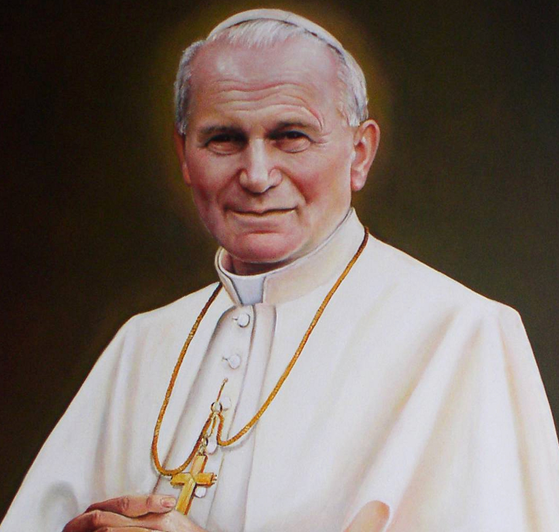 While on their periodic official visit (AD LIMINA) in 1991, Emmanuel Cardinal Wamala, then the Metropolitan Archbishop of Kampala invited Pope John Paul II Uganda.
While on their periodic official visit (AD LIMINA) in 1991, Emmanuel Cardinal Wamala, then the Metropolitan Archbishop of Kampala invited Pope John Paul II Uganda.
The Holy Father then chose 5th to 10th February 1993 for his 57th apostolic journey, which was in Uganda. While in Uganda, Pope John Paul visited Kampala, Gulu, Soroti and Kasese.
“You’re Excellency President Museveni, Honorable Members of the Government, My Brother Bishops, Dear Ugandan Friends,
1. At the beginning of my Pastoral Visit to Uganda, I cannot fail to offer a fervent prayer of thanks to Almighty God who has given me the joy of this moment.
To all of you who have come here to welcome me with characteristic African hospitality I am truly grateful. I thank Your Excellency and the Bishops for inviting me to Uganda, and I ask God to reward all who have worked to make this visit possible.
2. I come to Uganda with deep affection for all her people. My journey brings me here at a significant turning–point in her development.
This is a period of reconstruction, not just of the economy but especially of the moral fiber of the nation. No one can ignore the considerable challenges that must be faced, but you are already showing that Ugandans, drawing above all on their own rich human resources, are fully capable of making this land a peaceful, secure home for everyone. All Ugandans are called to put aside the conflicts of the past, to seek reconciliation with one another, and to work together to build a society in which the dignity of the human person and respect for human rights will be the norm of conduct for all. In this great endeavor the Catholic Church will continue to play her part, in accordance with her religious nature and mission, in effective and generous cooperation with all sectors of the population. As with all my journeys, this visit has an eminently religious and pastoral purpose. It is the visit of the Bishop of Rome, the Successor of St Peter, to the local Churches in this land. As the one entrusted with the care of the universal Church I feel a special responsibility towards the young Churches of Africa. As often as possible I have tried to visit them, praying with them and rejoicing in their fresh vitality and joy–filled fidelity to the Lord. On these visits it is my concern to strengthen the faith of my Catholic brothers and sisters (cf Lk 22:32), and to encourage their unity in the one Gospel of Jesus Christ who died for our sins and rose again as the promise of new life (cf Rom 4:25). I look forward to celebrating, in Kampala, in Gulu, in Kasese, in Soroti, the grace of our adoption as God’s beloved children (cf 1 Jn 3:1-2). I also wish to extend the hand of friendship to the Christians of other confessions, to whom we are linked by being grafted on to Christ through the grace of Baptism. Be assured, dear Friends, of the Catholic Church’s firm commitment to the growth of ecumenical understanding and cooperation. To the followers of the other religious traditions too I offer my cordial greetings and good wishes.
3. I return to Africa at a decisive moment. A world divided into opposing economic and military blocs is being replaced by a world increasingly affected by a distressing imbalance between a developed North and a struggling south. As a new structure of international relationships emerges, it is vital for the cause of world peace and justice that Africa should be given its proper place. Is it a vain hope to think that this visit, in its own way, might serve to keep before public opinion the developed world’s responsibilities towards Africa? Neglect must not follow the former exploitation. It would indeed be tragic if this Continent, after enduring the unspeakable sufferings of the slave trade, the evil effects of colonialism and, more recently, the sad experiences of civil war, subservience to fruitless ideologies or misguided policies, should now be denied the help it needs in order to take its destiny into its own hands. Surely the nations of Africa have a right to expect disinterested help in securing genuine independence, so that at last they will be able to build their own future in their own way. Yes, Africa, based on its noblest cultural values and traditions, can find in itself the strength and inspiration to develop in solidarity, harmony and justice. My prayer and hope is that Africans will help one another to progress towards a better life, a freer and more brotherly life on this Continent. This is my firm conviction: that such progress is possible, and that the Church which I represent can greatly contribute to it. I am convinced that Africa’s well–being is supremely important to the world, for what you have to offer is decisive: a sense of man, a sense of God. For me, therefore, this visit means drawing attention to this Continent, and to the problems it forcefully sets before us: poverty and need, the terrible human cost of chronic conflict, the plight of millions of displaced persons, and yet an abiding sense of the spiritual dimension of man, of human dignity and respect for people.
4. Mr. President, Ladies and Gentlemen, Dear Friends: My pilgrimage has brought me to the Uganda of the Martyrs. May the freedom to profess one’s faith, to which the martyrs’ sacrifice bore the supreme witness, be the guarantee of every citizen’s right and duty to share effectively in the nation’s life. May the vital relationship with God, so characteristic of African culture – the opposite of a materialism which ends in slavery to selfish individualism – sustain you all in serving the common good, in building society on strong ethical principles, in opening your hearts to the suffering and needy among you. May your faith in God inspire you to give the best of yourselves to the construction of a new and better Uganda, where justice and peace will reign.
Nsanyuse nnyo okubalaba.
Katonda Kitaffe abakuume,
Era akuume Uganda.
HOMILY OF HIS HOLINESS POPE JOHN PAUL II AT UGANDA MARTYRS SHRINE NAMUGONGO (SUNDAY, 7 FEBRUARY 1993
Baana bange abaagalwa, Mbalamusizza mwenna. Mwebale okujja, Katonda Kitaffe tumugulumize.
(My beloved sons and daughters, I greet you all, Thanks for coming, let us praise God our Father).
"The effects of the light are seen in complete goodness and right living and truth" (Eph. 5: 9).
1. Today is Sunday. Jesus Christ, the Light of the world (Cf. Jn. 8: 12), is risen from the dead! At the Shrine of the Holy Martyrs of Uganda, we have gathered to celebrate Christ the Light of the world.
Christ’s Resurrection fulfilled the words spoken to the Holy City Jerusalem by the Prophet Isaiah: "Your light has come, the glory of the Lord is rising on you... above you the Lord now rises and above you his glory appears" (Is. 60: 1-2).
Isaiah then said: "The nations come to your light... your sons from far away" (Ibid. 60: 3-4). Yes. From far away the nations have come: from countless lands and peoples of the earth. For two thousand years. You too have come, people of Uganda, sons and daughters of Africa. You too have seen the light of Christ’s Resurrection. The light which produces "complete goodness and right living and truth".
2. This is the place where Christ’s light shone on your land with a particular splendor. This was the place of darkness, Namugongo, where Christ’s light shone bright in the great fire which consumed Saint Charles Lwanga and his companions. May the light of that holocaust never cease to shine in Africa!
The heroic sacrifice of the Martyrs helped to draw Uganda and all of Africa to Christ, the true light which enlightens all men (Cf. ibid. 1: 9). Men and women of every race, language, people and nation (Cf. Rev. 5: 9) have answered Christ’s call, have followed him and have become members of his Church, like the crowds which come on pilgrimage, year after year, to Namugongo.
Today, the Bishop of Rome, the Successor of Saint Peter, has also come on pilgrimage to the Shrine of the Holy Uganda Martyrs. Following in the footsteps of Pope Paul VI, who raised these sons of your land to the glory of the altars and later was the first Pope to visit Africa, I too wish to plant a special kiss of peace on this holy ground.
From this place I am pleased to greet the President of the Republic of Uganda and the representatives of the Government who honor us by their presence.
I greet all the members of the Church in Uganda. I rejoice to greet Archbishop Emmanuel Wamala and all my Brother Bishops of Uganda, particularly the Bishops of the South: Bishop Adrian Ddungu of Masaka, Bishop Joseph Willigers of Jinja and Bishop Joseph Mukwaya of Kiyinda–Mityana. I also welcome all the Cardinals and Bishops who have come from other countries to take part in this celebration. I greet the priests and the men and women Religious who have devoted their lives to serving their brothers and sisters in the faith. Today too my greetings go in a special way to Uganda’s lay faithful. I embrace you with love in the Lord Jesus. You are the heirs of the strong and faithful lay leaders with which the Church in Uganda was blessed from the beginning.
3. "You were darkness once", Saint Paul told the Ephesians, "but now you are light in the Lord" (Eph. 5: 8).
How eloquent were the words of Pope Paul VI in his homily at the canonization of the Uganda Martyrs!
"Who could foresee", the Pope asked, "that with the great historical figures of African martyrs and confessors like Cyprian, Felicity and Perpetua and the outstanding Augustine, we should one day list the beloved names of Charles Lwanga, Matthias Mulumba Kalemba and their twenty companions?" (Paul VI, Homily on the occasion of the canonization of the Uganda Martyrs, 18 October 1964).
Truly the Uganda Martyrs became light in the Lord! Their sacrifice hastened the rebirth of the Church in Africa. In our own days, all Africa is being called to the light of Christ! Africa is being called again to discover her true identity in the light of faith in the Son of God. All that is truly African, all that is true and good and noble in Africa’s traditions and cultures, is meant to find its fulfilment in Christ. The Uganda Martyrs show this clearly: they were the truest of Africans, worthy heirs of the virtues of their ancestors. In embracing Jesus Christ, they opened the door of faith to their own people (Cf. Acts. 14: 27), so that the glory of the Lord could shine on Uganda, on Africa.
4. Here at Namugongo, it is right that we give thanks to God for all those who have worked and prayed and shed their blood for the rebirth of the Church on this Continent. We give thanks for all who have carried on the work of the Martyrs by striving to build a Church that is truly Catholic and truly African.
In the first place, I wish to acknowledge the outstanding service provided by your catechists. In recent times some of them, like the martyrs of old, have even been called to give their lives for Christ. The history of the Church in Uganda clearly shows that generations of catechists have offered "a singular and absolutely necessary contribution to the spread of the faith and of the Church" (Cf. Ad Gentes, 17) in your country.
How obvious this was even at the dawn of Christianity in Uganda! Despite the fact that they themselves had only recently come to know Christ, your Martyrs joyfully shared with others the good news about the One who is "the way and the truth and the life" (Jn. 14: 6). They understood that "faith is strengthened when it is given to others" (John Paul II, Redemptoris Missio, 2).
Dear Catechists: What you have freely received, you must freely give! (Cf. Mt. 10: 8) Deepen your knowledge of the Church’s faith, so that you can share its treasures ever more fully with others. Always strive to think with the Church. Above all else you must be devoted to personal prayer. Only if your ministry is nourished by prayer and sustained by genuine Christian living will it bear lasting fruit. Your catechesis can never be only instruction about Christ and his Church. It must also be a school of prayer, where the baptized learn to grow into an ever deeper and more conscious relationship with God the Father, with Jesus, the first–born of many brothers and sisters (Cf. Rom. 8: 29), and with the Holy Spirit, the giver of eternal life.
The effects of Christ’s light must clearly be seen in the goodness of your lives! You must be examples of a faith that is rooted in a personal relationship to Jesus, lived in full communion with the Church. Your faith must be clearly seen in your obedience to the Gospel, in your lives of charity and service, and in your missionary zeal towards those who still do not believe or who no longer live the faith they received at Baptism.
Take to heart Saint Paul’s lesson: be examples of patience and charity towards all people, mindful that if you have not love, then you are nothing at all (Cf. 1Cor. 13).
5. "You are light in the Lord!" How brightly the light of Christ shines in the lives of the lay men and women committed to the pursuit of holiness in the quiet and often hidden circumstances of their lives! In particular I wish to express the Church’s esteem for the women of Uganda. I encourage you: do not be afraid to let your voices be heard! God has given Ugandan women important gifts to share for the building of a more human and loving society, a society which respects the dignity of all people, especially of children and those most in need. How important is the apostolate of Christian families for the growth of society and of the Church! Christian married couples: be faithful to each other! Never forget the sacred calling you have received to pass on the faith and to train the younger generation to live in a way pleasing to God. Africa needs the witness of Christian families, families which are schools of generosity, patience, dialogue and respect for the needs of others!
I am pleased to see here the representatives of the various Associations and Ecclesial Movements which play so important a role in the life of your local Churches. Dear friends: your desire for holiness and authentic Christian living is a great gift of God to the Church in our time. Be of one mind and heart with the Church’s pastors. Jesus is calling you to be missionaries of his love, and a leaven of reconciliation and renewal in the midst of his People. I encourage your efforts to bring the Good News of Christ to all, particularly to the lukewarm and to those who are not reached by the Church’s ordinary pastoral care.
6. "Shine out, for your light has come!" (Is. 60: 1).
Christ’s words are addressed to you, the lay faithful of Uganda! To each of you Christ says: "Your light must shine in the sight of men, so that, seeing your good works, they may give the praise to your Father in heaven" (Mt. 5: 16).
How much the people of Uganda need the light of the Gospel in order to dispel the darkness still left by long years of civil unrest, violence and fear. Today, Uganda stands at the crossroads: her people need the salt of God’s word to bring out the virtues of honesty, goodness, justice, concern for the dignity of others, which alone can guarantee the rebuilding of their country on a firm foundation.
Uganda needs to hear the word of God! How many of your brothers and sisters have still not met Christ! To all of you I repeat today that challenge which Pope Paul VI left to you: you must become missionaries to yourselves! Let your enthusiasm for evangelization be accompanied by an ever more sincere commitment to work for the unity of all who profess the name of Christ. Relations between Christians should be marked by harmony and a spirit of mutual respect. Despite divisions, efforts to promote Christian unity are themselves a powerful sign of the reconciliation which God wishes to accomplish in our midst (Cf. John Paul II, Redemptoris Missio, 50).
7. Laity of Uganda! "You must be the salt of the earth and the light of the world" (Cf. Mt. 5: 13-14). If your works contain the salt of "goodness, right living and truth", then your lives will truly become light for your neighbors.
Christ calls you to lead a life pleasing to God. When you were reborn in the waters of Baptism, you were made a new creation, given a share in his divine life and sent forth to bear witness to the One who called us out of darkness into his kingdom of light (Cf. Col. 1: 13).
Saint Paul says it very clearly: "Have nothing to do with the futile works of darkness" (Eph. 5: 11). You have renounced Satan and his works. You have been bought at the price of Christ’s Blood, so you must never deny him by turning to idols, or by abandoning your Christian way of life for the empty promises of a culture of death! "You were darkness once, but now you are light in the Lord" (Ibid. 5: 9). Let the Martyrs be your inspiration! They did not profess Christ with their lips alone. They showed their love for God by keeping his commandments (Cf. 1Jn. 5: 3). Christ’s image shone forth in them with a spiritual power that even now draws people to him. In their lives and in their deaths, the Martyrs revealed the power of the Cross, the power of a faith that is stronger than fear, a life that triumphs over death, a hope that lights up the future, and a love that reconciles the bitterest of enemies.
8. "The Lord will be your everlasting light" (Is. 60: 20). I thank God for this opportunity to celebrate the Holy Eucharist with you at the Shrine of the Holy Martyrs of Uganda. The Martyrs were called upon, amid this beloved African people, to "shine in the sight of men" (Mt. 5: 16). In them Christ’s parables of salt and light have been fulfilled. In their earthly life, the Martyrs "tried to discover what the Lord wants" (Cf. Eph. 5: 10) and acted in a way worthy of the calling they had received. As followers of Christ, they were ready even to give their lives for him.
The Holy Spirit "lit this light" in Namugongo. Through the ministry of the Church, he also ensured that the light would not remain hidden, but would "shine for everyone in the house" (Cf. Mt. 5: 15): in your house, in Uganda and in all Africa.
Mwebale okumpuliriza. Kristu abeere ekitangaala mu Africa yonna.
(Grazie per avermi ascoltato. Possa Cristo essere la luce di tutta l’Africa).
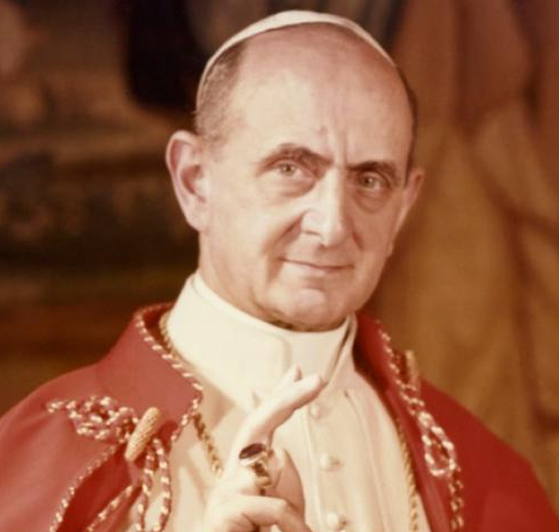
Thanks be to God also for the marvels of His grace, poured out abundantly upon this land, and for the generous response of Africa to the Gospel message. To these, we bear witness by our pilgrimage to the sanctuary of the Martyrs of Uganda, whose blood bathed the Cross of Christ planted by the first Missionaries, and brought honor, renowned, and the merit of love’s highest testimony to all of Africa.
Our prayers today rise to God that Africa may flower forth with all the riches of its culture and noble traditions, advancing with ever longer strides upon the road of progress, “attracted to adopt new ways of life, introduced by science and technology” (Africae Terrarum, No. 13). The Church, you may be sure, will not remain a passive spectator. Already Church leaders have exhorted clergy, missionaries, and all Christians, to collaborate actively in each nation’s efforts towards economic and social development. For Development is the new name of Peace, «To wage war on misery and to struggle against injustice is to promote, along with improved conditions, the human and spiritual progress of all men, and therefore the common good of humanity» (Populorum progressio, No. 76).
To all, Christians and non-Christians alike, may our coming to this Continent bear humble witness to our sincere affection for Africa. May our presence here, through the intercession of the Holy Martyrs of Uganda stir up that immense movement of brotherly love, which can transform the peace and progress of peoples from a difficult ideal into a glorious reality.
God save Uganda! God bless Africa!"
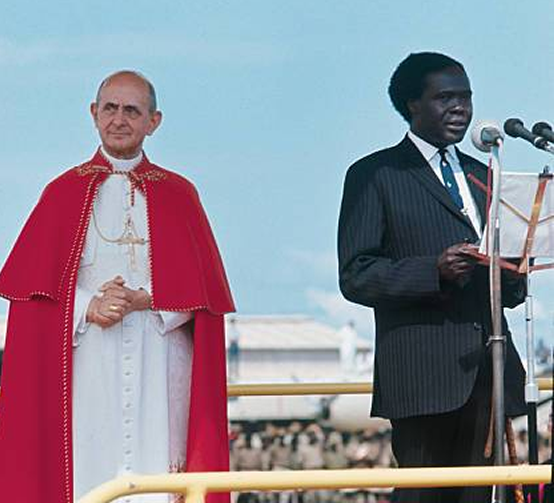 Now, you may ask me: Is Faith enough, to be living in God and to be saved?
Now, you may ask me: Is Faith enough, to be living in God and to be saved?Office Adress: Located in Namugongo 11 Km from Kampala Capital City P.O.Box 2055 Kampala, Uganda
Tel.+256 392 179 039 (Office)
+256 786 541 999 (Shrine Rector)
+256 702 335 694 (Administrator)
Email Address: info@ugandamartyrsshrine.org.ug